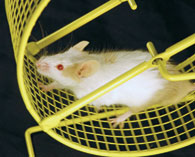McGill psychology professor finds mice have feelings

After accidentally ploughing open a mouse’s nest more than two centuries ago, Robbie Burns was moved to write “To a Mouse,” an anthropomorphic apology for the creature’s suffering. Now science is affirming Burns’ peculiar instincts: it turns out mice really do have feelings. Well, at least for each other.
McGill psychology professor Jeffrey Mogil recently discovered mice recognize—and react to—pain in their peers. Called “emotional contagion,” the phenomenon is suspected to exist in several primate species.
After injecting two mice with a solution that caused a 30-minute stomach ache, Mogil observed that both mice responded with more pain behaviours than mice tested alone. Mogil repeated the experiment, but blocked the mice’s view of each other, abolishing the effect.
“It appears that the message ‘I’m in pain’ is transmitted through vision,” Mogil told the New York Times. “We think the mice are reading others’ facial expression, but we don’t know for sure.”

Watching a buddy suffer also seemed to prime the pain pump. When Mogil heated a glass floor beneath their feet, mice exposed to a distressed cagemate reacted much faster than mice whose roomies were in better shape.
“This is the most striking part to me,” Mogil told the Times, “that simply looking at an animal in one type of pain makes you sensitive to another kind of pain in a different part of your body; that this social manipulation of pain sensitizes the whole pain system.”
While the empathy displayed by Mogil’s mice may hail from the same evolutionary well that causes humans to cry during sad movies, there are limits to mouse solidarity. Mogil’s rodents only responded to pain in familiar mice, like a cagemate or a relative. They’d be unlikely to cover their eyes during the scary bits of Stuart Little—and they certainly won’t be composing “To a Man.”
Jeffrey Mogil is the Canada Research Chair in the Genetics of Pain and E.P. Taylor Professor of Pain Studies. His research is funded by the U.S. National Institutes of Health, the Canada Foundation for Innovation and NeuroScience Canada.
